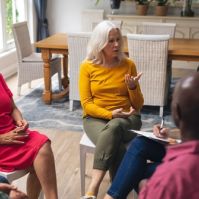
Imagine being unable to communicate vocally. Pretend you're walking outside and can't hear the cars coming down the road. You won't be able to listen to music, hear the television or know when your child is singing a song to her dolls. For many people, that world is a reality. Beethoven composed music without ever being able to hear his masterpieces. Just recently, Nyle DiMarco won "Dancing With the Stars" without being able to listen for the beat. Thomas Edison said that being deaf made him a better scientist.
Although it is challenging to live without hearing, many deaf people do not let their disability stop them. But many times, the deaf community is marginalized and forgotten about in society. How many churches have a deaf interpreter for services each week? Deaf people are often underrepresented at city council meetings, which are supposed to be open to everyone. The National Association for the Deaf estimates that there are only about 1 percent of movies shown with captions for the deaf. At the current rate of installment, it will be almost 2045 for every movie theater to have at least one caption display system.
The World Federation of the Deaf, along with its national affiliate NAD, celebrates the last week of September as the International Week of the Deaf. Many communities have special events focusing on ways to promote the rights of the deaf community and their contribution to arts, business and sports. The objectives of the week include:
Providing a greater understanding of the deaf and hard of hearing community Learning about sign language and why it's important to know basic signs to communicate Finding out about resources within the community for the deaf and for advocates Promoting the rights of deaf people to gain access to education, technologies and opportunities
Churches Need to Reach Out to the Deaf
A ministry can hire an interpreter every Sunday to help deaf people enjoy a service, but if the congregation really wants to include deaf people in their congregation, it's going to take a larger effort. "Ministry Magazine" offers some tips for churches to bridge the cultural gap. It's important to note that not every deaf person signs. Some deaf people learn to read lips and can speak to get by fairly well in the hearing world. Others, usually older people, become deaf through a sickness or aging, don't have signing skills. These individuals usually become isolated and lonely. Each type of deaf person may have their own set of challenges, but here are some general guidelines:
Learn the person's sign for their name. Talk to the deaf person and maintain eye contact. Don't talk to the interpreter, if there is one. Write back and forth if you need to. Any form of communication is better than silence. Include the deaf person in the conversation. Don't leave people out. Deaf people need to watch your mouth. Don't turn away or cover your mouth when you are speaking. Some terms are highly offensive to the deaf. Do not refer to deaf people as anything other than "deaf." Treat deaf people as equals. Their intellect is not affected by their hearing loss. They are not children, unless they actually are children. Don't stare at the deaf. Social graces still apply. Be natural. You don't have to "fix" their issues. When you are overly helpful, it can make someone feel disabled. When you are trying to meet the needs of the deaf, include them in the conversation. What you perceive as an issue may not be the one that needs to be fixed.
Take time during the last week in September to consider your own actions toward the deaf in your community. Can you be more open to communicating with a deaf person and including him or her in your circle? Be aware of the deaf community.



